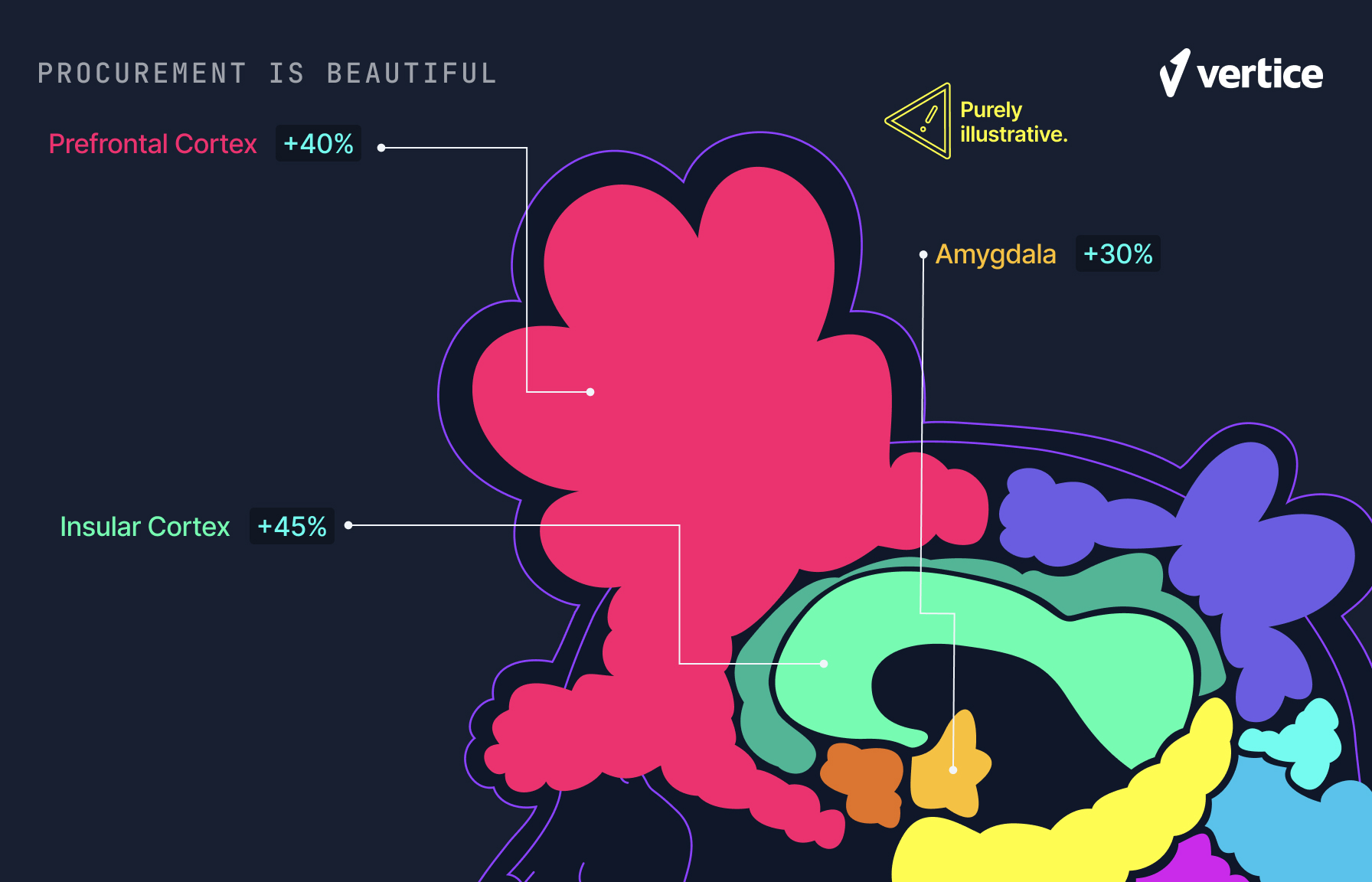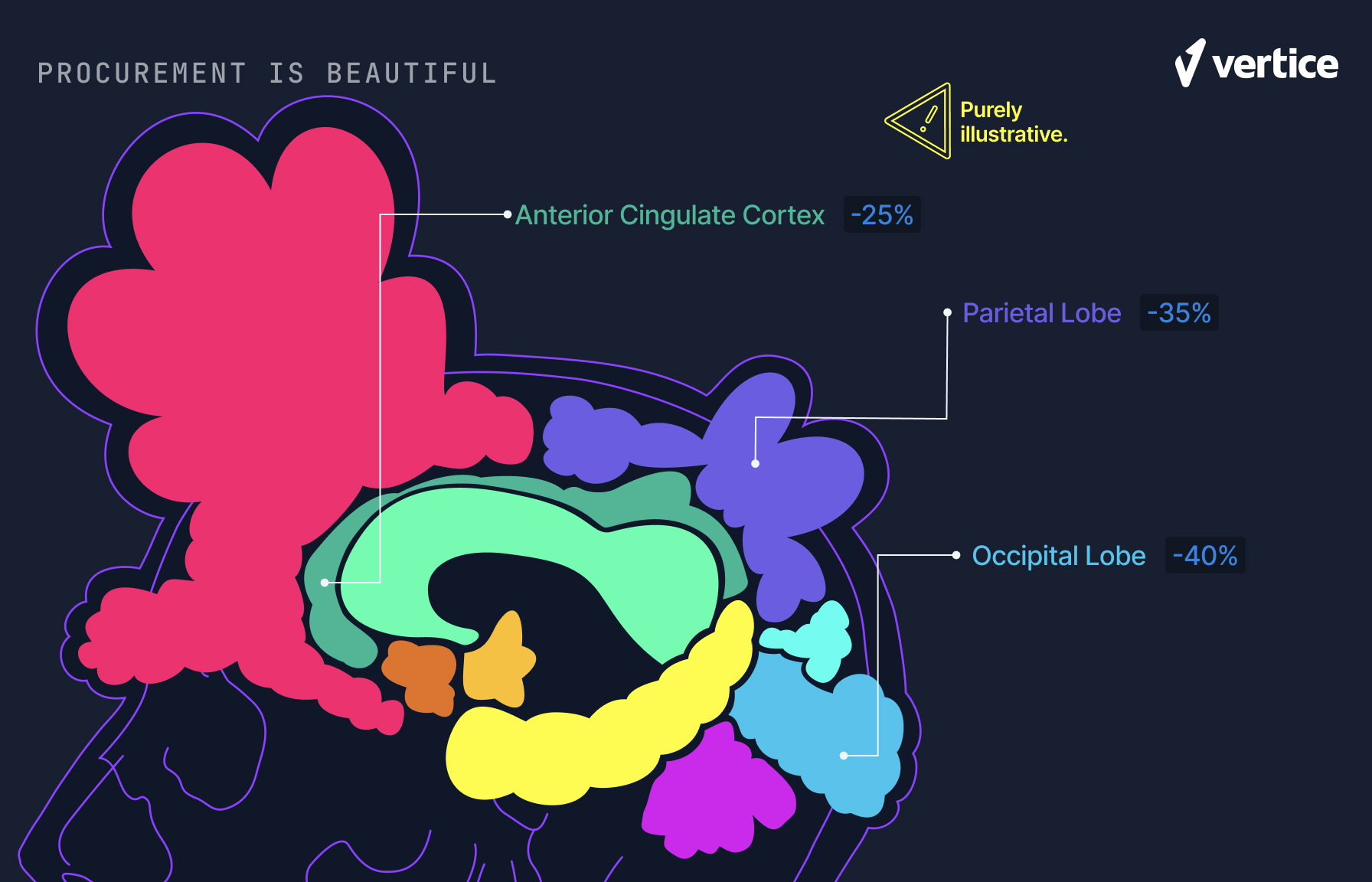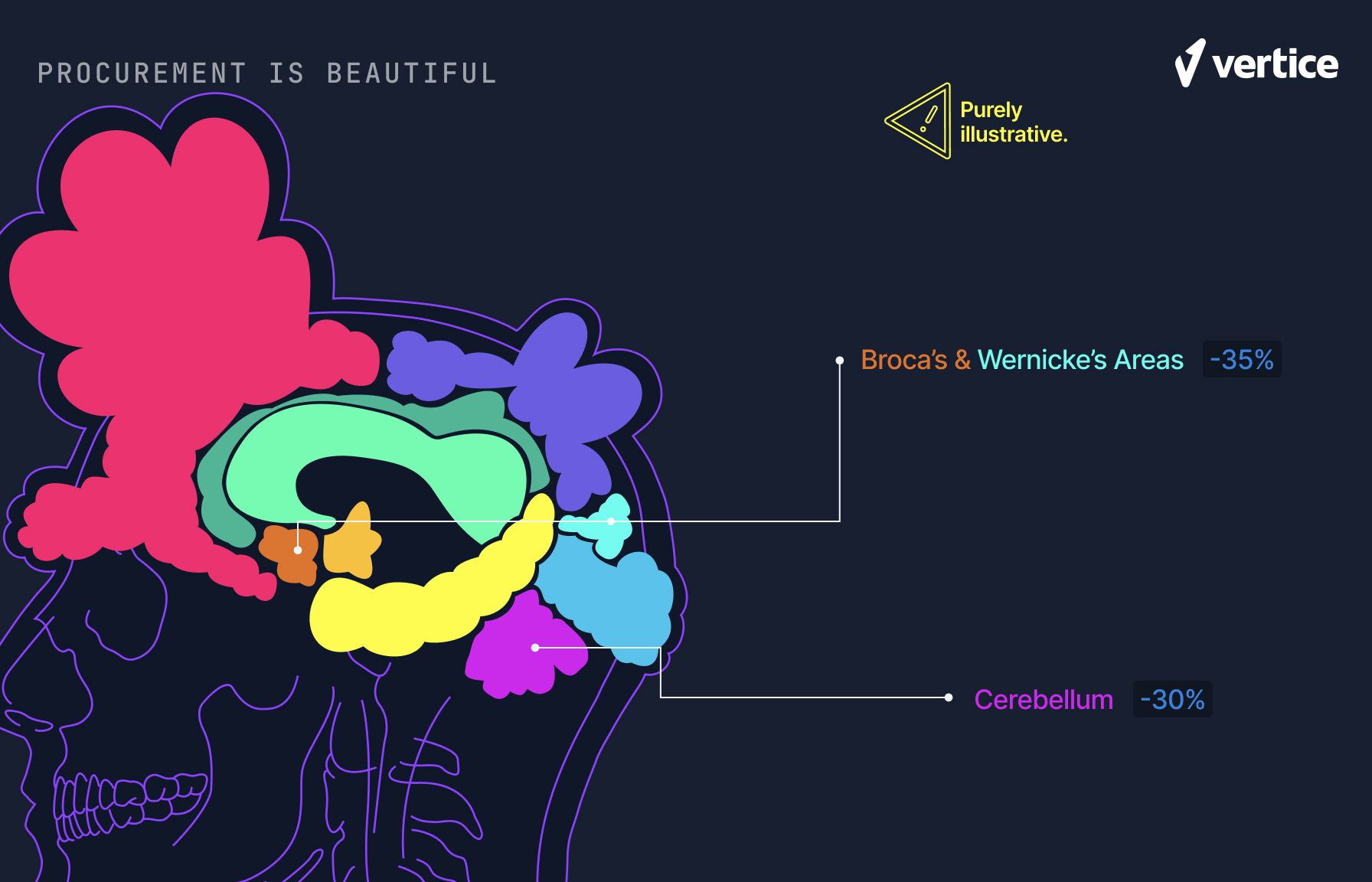Procurement is under evolution-altering pressure
.jpeg)
Take a self-guided tour of the platform.
See why Vertice is trusted by top procurement leaders.
Want an expanded version of The 2050 Procurement Brain?
Procurement is no longer just about cutting costs.
It’s about strategic value creation, risk management, and fostering innovation - and more besides.
Yet, if procurement teams and leaders continue to operate with outdated tools and processes, this future role becomes impossible to achieve.
The consequences of failing to adapt can be likened to the evolution of the human brain under duress, with certain areas growing disproportionately while others atrophy.
Remember: This is merely an illustrative metaphor, with zero scientific basis!
Planning, stress and memory centers are swelling
The Prefrontal Cortex
The brain's executive command center - responsible for planning and decision-making - is projected to see a 40% increase.
But this growth isn’t a sign of enhanced foresight.
It’s a direct result of the immense cognitive load required to keep pace with the constant, unpredictable shifts in pricing and vendor contracts.
Without smart, data-driven tools, procurement professionals are forced into an endless cycle of manual analysis, attempting to predict market movements and justifying decisions in a fog of incomplete information. The sheer mental energy expended on this task becomes unsustainable, leading to decision fatigue and increased errors.

The Amygdala
The brain's center for processing emotions like fear and anxiety, is predicted to swell by 30%.
In the absence of sufficient data to prove their impact, or use of the correct metrics, procurement leaders are left to grapple with immense stress and anxiety. Every negotiation becomes a high-stakes gamble, every report a potential point of failure. This environment of chronic stress erodes confidence and impairs judgment, making strategic thinking difficult.
The Insular Cortex
The part of the brain that regulates emotional responses is also projected to increase by 45%.
This isn’t a sign of greater emotional intelligence, but rather a symptom of raw stress. Negotiating without proper data or established playbooks creates uncertainty, heightening emotive responses, and leading to less rational, more reactive decision-making in critical moments.
The Hippocampus
Vital for long-term memory, this is set to experience a staggering 60% growth to compensate for a lack of proper data tracking.
Without centralized systems to log contract renewal dates, negotiation histories, vendor trends, and performance benchmarks, procurement teams must rely on sheer memorization.
This reliance on memory is fragile and prone to failure, creating a high-risk environment where crucial details are easily forgotten, leading to missed deadlines and poor negotiation outcomes.
The underuse of strategic and creative faculties

As some areas balloon under pressure, other critical parts of the ‘procurement brain' begin to shrink - and in almost all cases because of the same core issue: a lack of data.
The Parietal Lobe
Numerical estimation and pattern recognition are handled here, but it's expected to shrink by 35%.
Masked vendor pricing and a persistent lack of proper benchmarks make it nearly impossible to make accurate financial judgments. Procurement professionals are left blind, unable to see pricing trends or identify opportunities for savings, making this core cognitive function ineffective.
The Anterior Cingulate Cortex
This is responsible for mediation and conflict resolution, and will decline by 25%.
As the day-to-day work becomes a frantic scramble to manage contract specifics rather than a focus on strategic, big-picture relationships, the ability to mediate and build consensus wanes. The focus shifts from collaborative partnership to a transactional, detail-oriented approach, damaging long-term vendor relationships.
The Occipital Lobe
This is expected to decline by 40%, compromising basic perception and tracking abilities.
Obscure data, siloed tech stacks, and a lack of insight into usage analytics create a murky, chaotic view of the procurement landscape. It becomes impossible to spot opportunities or track performance accurately.

The Broca’s and Wernicke’s Areas
Responsible for speech and language processing, these are projected to shrink by 20%, causing a diminishing ability to communicate effectively.
This will be caused by lack of data and insights on vendors, which leaves procurement teams without the tools to persuade, and therefore reducing complex language needs.
The Cerebellum
Finally, as procurement teams become tied to their desks, manually juggling an ever-increasing number of contracts with little time for physical activity, the Cerebellum - which coordinates physical movement and health - is projected to shrink by 30%.
A new path for a healthier procurement brain
The metaphor of a distorted, struggling brain serves as a powerful warning.
This is where innovation comes in, providing the external support needed to rebalance the brain’s functions and avoid this cognitive evolution.
1. Embracing AI and procurement automation
The path to a healthier procurement brain lies in offloading repetitive, data-intensive tasks to intelligent systems.
Procurement automation powered by AI can handle the manual juggling of contracts, the tracking of renewal dates, and the compilation of vendor data.
By automating these processes, teams are freed from constant crisis management, allowing them to focus on true strategic planning - where the real procurement value lies.
A centralized, AI-driven platform also becomes the perfect long-term memory - accurately logging every detail and making it instantly accessible for procurement leaders and negotiators to deploy when needed, for instance in high-pressure negotiations.
2. Data as the ultimate antidote
The anxiety and ineffectiveness stemming from a lack of data can be cured by instant access to actionable insights. Tools that offer clear benchmarks, pricing trends, and supplier performance data provide a much-needed antidote.
Instead of relying on guesswork, procurement professionals can enter negotiations with a full playbook, empowering them to communicate with confidence, build persuasive narratives, and directly impact the business’s overall performance.
More data equals more solid decision making, which creates better savings and long term strategic investments that power unrestricted company growth.
A brighter future with Vertice
By adopting new technologies and processes, procurement leaders can build a healthier, more balanced ‘brain’, and a cemented, proven role as strategic partners in their organizations.
Vertice offers a way to simplify a complex, fractured landscape by bringing together SaaS spend management, workflows and procurement expertise in a single platform.
It provides a powerful combination of visibility, benchmarks and insights, workflows, AI and negotiation support by:
- Centralizing your internal data in one, easy-to-understand platform so nothing is siloed away.
- Enabling holistic visibility over all of your software agreements, key contract terms, and important dates such as upcoming renewals.
- Providing access to benchmarks and pricepoints from over 16,000 global vendors and more than $10bn in managed spend.
- Offering expert negotiation support from a one to one buyer that works directly with you.
Explore how Factorial, the world's fastest-growing HR tech company, achieved over $1m in savings in just 18 months and better procurement efficiency by partnering with us.
.webp)



.jpeg)
.jpeg)
.webp)